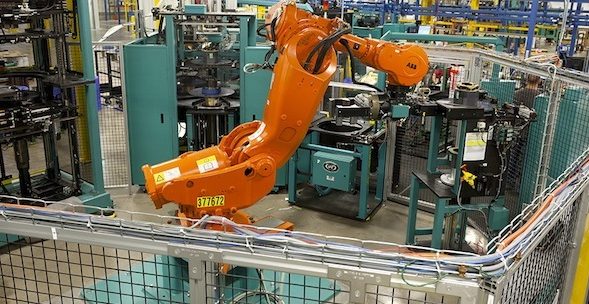Panel: Employee retention, training important for manufacturing companies
by October 4, 2021 4:44 pm 1,091 views

The biggest challenge facing manufacturing companies is attracting and retaining employees, said those participating in a panel discussion during the Fort Smith Regional Chamber of Commerce First Friday Breakfast held Oct. 1.
The panel included Mike Barr, president of WeatherBarr Windows & Doors; Heidi Raynor, human resources generalist with Trane Commercial Systems, and Andrew Welch, director of operations at Rheem Manufacturing, and was held at the University of Arkansas at Fort Smith.
“We’re going to have to make some major changes going forward. I think retention is the focus right now whereas in the past, it might not have been. We’re going to have to kind of get creative on drawing those people in and keeping them,” Raynor said.
Barr agreed that it has become much more important to talk about retention in the industry, to track employees and to be more stable.
“It’s been a challenge as we have grown in the past five years. We have been extremely impacted by the ability to retain employees we really need,” he said.
He said while retention was an important topic a few years ago, the COVID-19 pandemic has put the situation “on steroids.”
“The employment gap is much more significant than what it was and much more a challenge to deal with as a small business,” Barr said.
Something that will help the challenge to attract and keep employees is workforce development, members of the panel said. Technology changes have led to a change in the skill set needed for workforce development, Barr said. But not necessarily in a way most commonly thought. Because equipment can make things easier and is constantly improving, the industry needs workers with much more practical skills that often already exist, rather than ones trained on specific equipment, Welch said.
“I don’t think the incoming workforce, when we talk about that next generation, has a lot of difficulty latching onto technology. … What is needed is practical skills to go along with that ability to process the advanced equipment. Problem solving is a great example because the equipment is going to be intuitive. The equipment is going to be easier and easier to use. The question is, how do we make sure we are training these employees to engage the data and process that data for critical thinking and problem solving,” Welch said.
Cross training is going to become more and more important, Raynor said. She also said even younger students need to be made aware that manufacturing is different than it was in the past.
“There are so many opportunities now,” Raynor said.
She said the option of technical training needs to be pushed as much as four-year colleges. Students need to know that subjects of interest to students can be found in technical trades and that manufacturing does not mean just working on a factory floor like it did in the past, Raynor said.
“We need to focus on making sure they know they can have meaningful work in manufacturing. It is what people are looking for,” Welch said.
